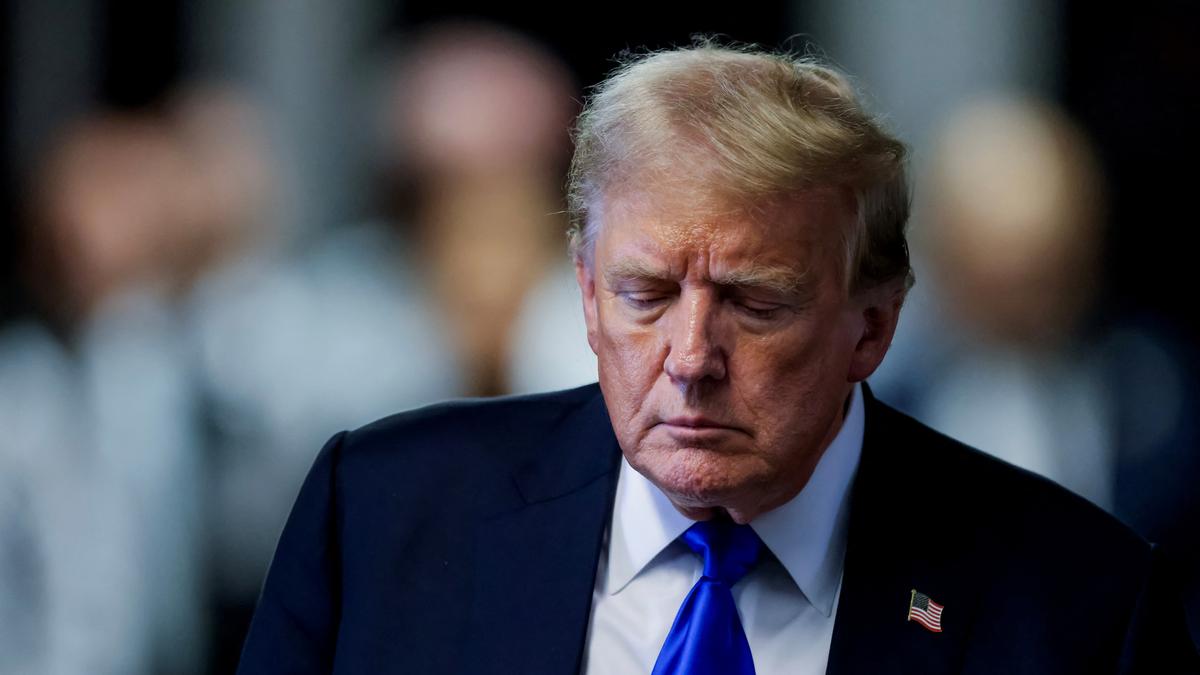WASHINGTON: Donald Trump Conviction Sets Historic Precedent, Sentencing Looms
In a landmark event just months before the upcoming election, where he aims to return to the White House, former President Donald Trump was convicted by a Manhattan jury on all 34 charges in his hush money case. This makes Trump the first former U.S. president to be found guilty of criminal offenses. The jury convicted him of falsifying business records to conceal his relationship with an adult film actress, with the intent to influence the 2016 election. Despite the conviction, Trump remains eligible to campaign for another term.
Donald Trump described his guilty verdict as a “disgrace” and remained composed as it was read, while cheers from the street below resonated through the courthouse. The jury’s decision came after nine hours of deliberation. Judge Juan Merchan has scheduled Trump’s sentencing for July 11, just before the Republican National Convention in Milwaukee, where GOP leaders are expected to nominate him formally.

“This was a rigged, disgraceful trial,” Donald Trump told reporters after leaving the courtroom. “The real verdict will come on November 5 by the people. Everyone knows what happened here.”
Decisive Sentencing Awaits
With the jury’s historic decision in place, Judge Merchan now faces a crucial decision: whether to sentence the 2024 Republican presidential candidate to imprisonment. While jail time is uncommon for first-time white-collar offenders in New York convicted of felony falsification of business records, Trump’s unique circumstances add complexity to the decision.
Legal experts indicate that such cases rarely lead to imprisonment. Andrew Weinstein, a New York defense lawyer, noted, “Typically, this is not the kind of case where a first-time white-collar offender would expect a sentence of incarceration. But everything about Trump is different.”
Donald Trump was convicted of falsifying his company’s records to cover up his former lawyer Michael Cohen’s $130,000 payment to Stormy Daniels, a porn star, to buy her silence before the 2016 election about an alleged sexual encounter. Prosecutors argue the hush money payment was part of a broader scheme violating campaign finance and tax laws to suppress damaging information about Trump.
Legal Precedents and Expert Opinions
Six legal experts, including defense attorneys and former prosecutors, told Reuters that it is uncommon for individuals without prior criminal records charged solely with falsification of business records to receive prison sentences in New York, with fines being more typical. However, they cautioned that a prison sentence for Trump is not impossible due to the discretionary nature of sentencing and the unique aspects of his case.
Tanisha Palvia, a former prosecutor in the Manhattan District Attorney’s Office, remarked, “It’s not often that someone gets significant jail time on this particular charge. But given the discretion involved, it’s not unheard of for a first-time offender to receive prison time.”
Reactions from Supporters and Potential Appeals
Donald Trump’s supporters, outraged by his conviction, inundated pro-Trump websites with calls for riots, revolution, and violent retaliation. Some advocated for attacks on jurors and the execution of Judge Juan Merchan, highlighting the intense and polarized reactions to the verdict.
Trump intends to appeal the verdict and plans to continue his campaign despite the convictions. Although no rallies are currently scheduled, he is expected to appear at Donald Trump Tower and attend a Manhattan fundraiser planned before the verdict. His campaign has leveraged the verdict for fundraising, portraying him as a “political prisoner.”
Broader Context and Future Implications
The maximum sentence for falsification of business records is four years in prison. In deciding the sentence, Merchan may consider the severity of the charges due to their ties to the 2016 election and Trump’s decision to go to trial rather than plead guilty. Manhattan District Attorney Alvin Bragg, who brought the charges, declined to say whether his office would seek a prison sentence.
Incarcerating a former president who may win the presidency again in November and is entitled to round-the-clock Secret Service protection poses unprecedented challenges. Merchan acknowledged this complexity, stating, “Incarceration is truly a last resort for me.”
In established democracies like France, South Korea, and Israel, prosecuting leaders has reinforced the rule of law. However, in emerging democracies, overzealous prosecutions where judicial independence may be compromised can be damaging and politically motivated.
Political and Legal Reactions
Reactions to the verdict have been sharply divided along political lines. Senator Ted Cruz called it a “dark day for America,” describing the trial as a “sham” and accusing Democrats of political persecution. Texas Senator John Cornyn echoed this sentiment, stating, “This verdict is a disgrace, and this trial should have never happened.”

On the other hand, Democratic figures like U.S. Rep. Elissa Slotkin and exonerated “Central Park Five” member Yusef Salaam expressed a somber acceptance of the verdict, emphasizing the importance of upholding justice and the rule of law.
Looking Ahead
Donald Trump’s conviction presents voters with another test of their willingness to accept his boundary-breaking behavior. While his legal team prepares for appeals, his political campaign continues, bolstered by a unified Republican Party rallying behind their embattled presumptive presidential nominee.
As Donald Trump’s legal battles continue, the American judicial system’s ability to handle such high-profile cases fairly and impartially remains under scrutiny. The outcome of these cases will not only shape Trump’s political future but also influence the broader landscape of accountability and justice in American democracy.
Related Article(s): US-India Relations in Light of Modi’s Growing Influence
